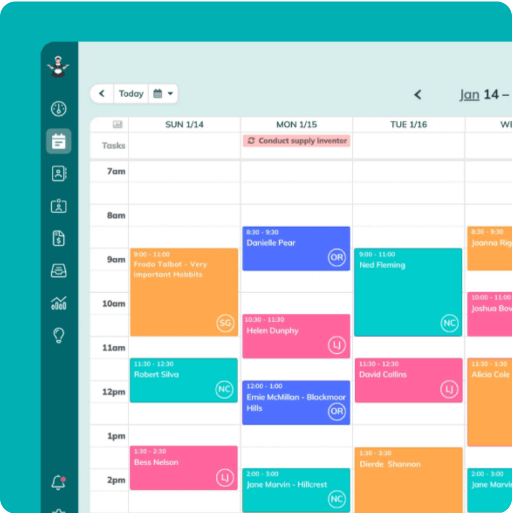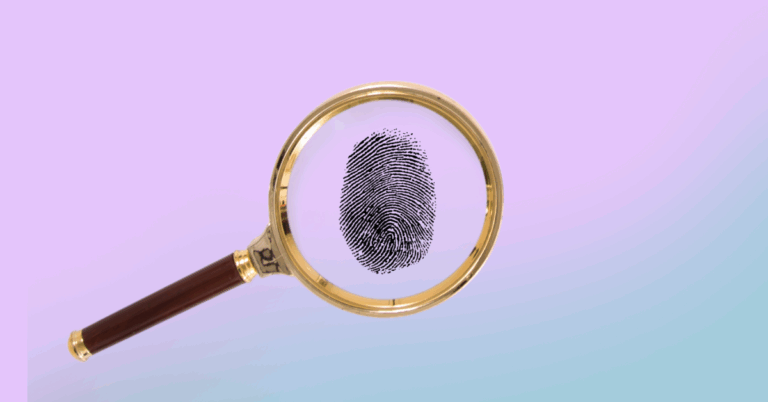
Brought to you by expert maid service owners
This article was written in collaboration with Sure Check Background Screening.
Special offer! Try out Sure Check with $100 in credit for your next hires today!

Most cleaning business owners will say hiring is one of the most difficult aspects of their business. Between high turnover and your employees working in unsupervised homes or offices, trust is everything. One bad hire and you risk lawsuits, fines, or your company getting shut down.
That’s why most insurance providers require cleaning companies to conduct background checks on their new hires. It’s one of the best steps you can take to protect your reputation and business.
This guide breaks down exactly what cleaning companies need to know to hire safely, stay compliant, and avoid costly mistakes.
Table of contents
- Common Misconceptions About Background Checks
- Why Background Check ‘Hits’ Don’t Always Mean a Bad Hire
- Employee Screenings — More Than Just Background Checks
- Best Practices for Background Checks When Hiring Cleaners
- Reduce Risk, Hire Right, and Sleep Better at Night: Why Cleaning Companies Need to Screen Their Candidates
- What to Look for When Evaluating Providers
- Hiring Laws to be Aware of (EEOC, Ban the Box, and FCRA)
- Frequently Asked Questions
Common Misconceptions About Background Checks
When we talk with cleaning business owners, the same myths keep popping up. Here are a few of the big ones:
“I can just Google them or check Facebook” — Social media might give you a sense of personality, but it won’t tell you if someone has a criminal record, lied about employment, or is legally allowed to work. Courts don’t post cases on Facebook!
“I can look them up on a local court site for free” — Some counties make records available online, but it’s not complete or nationwide. People move, and if you only search one county, you’ll miss records from everywhere else they’ve lived.
“State police checks are enough” — State checks are often incomplete because most records are stored at the county level. Some counties do not even report to their state systems. Over 90% of criminal data sits in county courts, not in a single state database.
“I only need checks for full-time employees” — Wrong. Part-timers and contractors still go into your clients’ homes and offices. If they steal or cause harm, your client won’t care whether they worked 5 hours or 40.
“Once is enough” — Employees can pick up new charges after they’re hired. That’s why many companies re-screen annually to stay protected.
Why Background Check ‘Hits’ Don’t Always Mean a Bad Hire
Even if a candidate interviews well and seems to be a great fit, there’s no way of knowing their history without a background check. However, even if something does show up in their criminal history, it’s not always a valid reason to reject them. Based on data from Sure Check Background Screening from 2025, about 1 in 4 background checks (25%) show a “hit” — a record or discrepancy of some kind.
But here’s the important part: A hit does not automatically mean a record. It might be an old misdemeanor that’s no longer relevant, or a record that doesn’t relate to the job duties.
For this reason, federal guidelines (EEOC) make it clear: employers must perform an “individualized assessment” before making a decision.
What is an individual assessment?
Instead of tossing out every applicant with a record, you must:
- Look at the nature of the offense — Was it theft, assault, or something unrelated like a parking violation?
- Consider the time passed — Most states follow the “7-year rule,” which limits how far back background checks can report records. Something from 15 years ago may not even appear, while a recent conviction will. A handful of states (like CA, NY, TX, and MA) have stricter variations, so pay attention to the rules in your state
- Relate it to the job duties — Does it directly affect safety in cleaning someone’s home or school? Would you hire someone with an assault record? Theft charge? Parking ticket? Best practice is to think through this in your company policy
- Give the applicant a chance to explain — Many companies are surprised by what comes out in this conversation. If you’re considering not hiring someone based on their report, you must give them a copy and a chance to explain it before making a final decision
Say you’re hiring for a commercial cleaning crew:
- Candidate A has a theft conviction from 12 years ago, served their sentence, and has since worked steadily with no issues
- Candidate B has a recent assault charge from last year
Both would trigger a “hit”, but only one poses a clear risk to your clients and business.
When you do an individual assessment of each candidate, you stay compliant with EEOC guidelines and avoid losing good employees. But be cautious here — there are entire law firms dedicated to suing employers who mess up this process. Following the steps exactly isn’t always red tape; it’s how you protect your business from costly legal action.
Employee Screenings — More Than Just Background Checks
Don’t you want to be adding rockstar cleaners to your team? A thorough screening process gives you a better idea of whether the person would make a good fit for your team, beyond any potential risks to the business or your trusted clients.
Having a solid process in place saves you time and money in the long run. You can confirm where someone has worked, how long they stayed, and what past employers say about them, which paints you a baseline picture of the type of employee they are (and whether they’re likely to be a reliable, long-term hire).
That means fewer bad hires, less turnover, and less time wasted starting the hiring cycle all over again.
Best Practices for Background Checks When Hiring Cleaners
Now, let’s dive into best practices when it comes to hiring cleaners. One thing that Stephanie Pipkin, our resident cleaning business expert and owner of Serene Clean, recommends is to always ask a candidate, “What are we going to find?”
In her words, “We’re gonna find stuff. We ask them because we can see if they’re honest and upfront from the beginning. Obviously, that’s nerve-racking, but it’s helpful when they provide context. Then, we’ll see if their story coincides with what we can find.”
You can hear Stephanie’s full take on it here:
Once you follow through with that conversation, the four “formal” practices most businesses undertake are criminal background checks, employment verification, reference checks, and/or drug testing.
1. Criminal Background Checks
It’s important to understand how your provider will charge you. Some charge per county, so if your candidate has moved around in the last seven years, you could easily pay 2–3X more than the sticker price you thought you were getting.
The gold standard of criminal background checks is to check county records, as most state systems are not up to date, and not all countries report to state systems.
An FCRA-compliant background check will include:
Social Security Number Trace (SSN Trace)
This pulls address history from credit bureaus to identify which counties a candidate has lived in the last 7 years. This traces the address any time a person applied for credit, like a store credit card. This serves as the roadmap for where to search. If you’re not searching counties, you’re not getting the full picture.
Alias Search
When someone applies for credit, they may have used more than one name in the past, like a maiden name, nickname, or a different spelling. An alias search looks at the person’s Social Security number history to pull up all the names and addresses tied to them.
This matters because criminal records are filed under the name used at the time of arrest or conviction. If you only check one name, you could miss something.
What names should be checked:
- Legal name (current full name)
- Former legal names (like maiden names after marriage or divorce)
- Commonly used nicknames (if they appear in the SSN trace)
In short, you only need to search all legal names tied to a candidate’s SSN to make sure nothing slips through the cracks.
Nationwide Criminal Database Search
This database is more of an indicator tool than a reliable search. Although it covers ~55% of counties, plus sex offender registries, terrorist watchlists, OFAC, OIG, and 800+ other databases. While it’s good for casting a wide net, it’s not enough on its own; false positives and gaps are common.
County Criminal Search
Most criminal records (over 90%) are stored at the county level. Reports usually come back in 2–4 hours, but if records aren’t digitized, a researcher has to pull them manually. About 307 counties nationwide charge additional access fees ranging from $1 to $95 (New York being the most expensive at $95).
2. Motor Vehicle History Checks
For cleaning companies with employees driving between jobs or using company vehicles, a Motor Vehicle Report (MVR) is essential. It verifies that a candidate has a valid license and flags issues like DUIs, reckless driving, or a suspended license.
Reports typically come back instantly and include up to seven years of driving history, depending on the state. They show violations, accidents, and license status.
While an MVR won’t replace a criminal search, it’s a critical layer of screening for roles that involve driving.
3. Employment Verification
An employment verification is a request that goes directly to the employer.
It confirms factual details, like job title, dates of employment, eligibility for rehire, and sometimes the reason for leaving. In the age of ChatGPT resumes, it validates the accuracy of their work history.
An employment verification typically takes 1–3 business days. When you outsource this service, the company reaches out directly to the employer to confirm the candidate’s job details, most importantly, their dates of employment (and in some cases, job title and rehire eligibility). This can be done for as low as $5 and gives you one less thing to worry about.
4. Reference Checks
Speaking directly with past supervisors gives great insight into the reliability and work ethic of your candidate. It could also reveal attendance issues or strengths like attention to detail and trustworthiness.
When you outsource reference checks, you take another task off your plate so you can focus on running your business while still gaining the peace of mind that comes with hiring the right people.
5. Drug Testing
The ongoing opioid crisis has touched every community in the US, which means you can’t afford to gamble on who you bring into your clients’ homes. Drug screening helps reduce risks for both employers and clients.
Most companies use either a 5-panel test (covering common substances like marijuana, cocaine, opiates, amphetamines, and PCP) or a 10-panel test, which adds prescription and synthetic drugs that are increasingly misused.
Tests are administered at clinics, and results usually come back within 1–3 days. The most common facilities are LabCorp and eScreen. LabCorp is typically more affordable, while eScreen provides broader testing options (including DOT and occupational health services) and a larger clinic network, especially helpful in rural areas. Both have facilities nationwide, and clients choose based on their priorities: cost, coverage, or specialized testing needs.
Summary Table: Background Checks for Cleaners
If you take nothing else away from this article, let it be this:
| Check Type | What It Covers | Why It Matters | Typical Turnaround / Cost |
| Criminal Background Checks | SSN Trace (address history, aliases)Alias search (maiden names, nicknames)Nationwide database search (~55% counties, watchlists, sex offender registries, etc.)County criminal search (90%+ of records, manual pulls if not digitized; some counties charge $1–$95) | Ensures a full picture of a candidate’s criminal history; county-level searches are the most reliable. | 2–4 hours (digitized records)Extra fees in 300+ counties |
| Motor Vehicle History Check | Valid driver’s license, license class/type, suspensions, revocations, accidents, DUI/DWI, moving violations, and points on recordTypically up to seven years (depending on the state) | Essential for any role that involves driving. Whether using a company vehicle or transporting staff, equipment, or clients. Confirms that the employee is legally allowed to drive and flags risky behavior (DUIs, reckless driving) that could expose your company to liability. | Instant to 24 hours in most states. Fees vary by state, typically $3–$20 per record. |
| Employment Verification | Confirms job title, dates, eligibility for rehire, and sometimes reason for leaving. | Validates the accuracy of work history in an era of embellished resumes. | 1–3 business daysOutsourced verifications as low as $5 |
| Reference Checks | Direct conversations with past supervisors. | Reveals reliability, attendance, work ethic, and strengths beyond a resume. | Varies (outsourcing saves time for business owners) |
| Drug Testing | 5-panel (common drugs) or 10-panel (includes prescription/synthetics). Conducted at clinics like LabCorp or eScreen. | Protects business and clients; addresses opioid and substance risks. | 1–3 business daysLabCorp = lower cost; eScreen = broader coverage/network |
After having worked with dozens of cleaning businesses, we recommend the following priorities around background checks:
- Standardize your policies — Run background checks on every new hire, part-time, full-time, or contract, so the rules are clear and fair
- Be transparent with clients — Let them know, “Our cleaners are vetted and verified.” This builds trust and sets you apart from competitors
- Pair with clear policies — Put expectations in writing, contracts, training, and company policies should work hand-in-hand with your screening process
Reduce Risk, Hire Right, and Sleep Better at Night: Why Cleaning Companies Need to Screen Their Candidates
It only takes one wrong hire. In 2012, a cleaner in Colorado was caught stealing from houses on the job. Hidden cameras showed her stealing jewelry during multiple shifts. Police later found about $10,000 worth of stolen items in her car. The cleaning company shut down after the thefts were exposed, while also paying hefty fines.
That said, screening candidates can take a load of worry off. Here’s what we recommend.
What to Look for When Evaluating Providers
Depending on the maturity of your business and the number of employees you have, you have a few options for evaluating background check providers.
1. Pay-as-you-go vs. monthly fees
This avoids surprise subscriptions. Make sure the tool lets you pay per check without locking you into a monthly charge.
Ask if they charge you setup fees, licensing fees, or lock you into a contract. No one wants to pay for screening when they’re not using the tool.
2. Databases included in the criminal background check
Above all, make sure the provider is checking the county records and building you a full FCRA-compliant package. This includes a Social Security trace and a Nationwide criminal search.
- County-by-County Pricing — Watch for providers that charge separately for each county search. If your candidate has lived in multiple counties, costs can skyrocket. Keep an eye out for any vendor that slips this in the fine print
- Adverse Action Support
If you’re planning to reject a candidate based on their criminal record, check if the provider supports you through the tricky Adverse Action process. This can potentially be a legal minefield with employment lawyers waiting for you to slip. Do they assist with notification, disclosures, and documentation? Can they advise you on the steps to take in a Ban-the-Box state?
A high-quality background-checking service will supply complimentary adverse action procedures in conjunction with an employment law firm.
3. Accessible customer service
What happens if you have a question about something that comes up in a report? It’s essential to be able to get in touch with someone who picks up the phone. With Sure Check, you get an FCRA-certified HR professional to help you understand exactly what you’re looking at. Many large providers outsource their customer service overseas to a crowded call center.
4. Speed and transparency
When you need staff for a last-minute job, waiting around for background checks isn’t an option. Some providers can drag things out for up to a week, slowing down your business. At Sure Check, results average eight hours, so you can hire quickly.
The key is choosing a provider that’s upfront about timelines and clear about where their data comes from, no waiting, no guessing.
Hiring Laws to be Aware of (EEOC, Ban the Box, and FCRA)
Lastly, let’s go over the hiring laws you need to be aware of as you grow your business.
EEOC (Equal Employment Opportunity Commission)
The EEOC makes sure employers don’t automatically reject someone just because they have a criminal record. For cleaning companies, this means you can’t have a blanket rule like “no one with a record can ever be hired.” Instead, you need to look at:
- Type of offense — Was it theft, violence, or something unrelated, like an old traffic violation?
- How long ago it happened — 10 years ago isn’t the same as last year
- Relevance to the job — Theft is highly relevant when employees are working in homes or offices unsupervised
For cleaners: you’re allowed to consider records that pose a real risk to your clients and business. However, you must show that you used a fair, individualized process for each candidate.
Ban the Box
Many states and cities have “Ban the Box” laws, which mean you can’t ask about criminal history on the initial job application. There are 37 states, like California, Colorado, and Washington, D.C., with some version of Ban the Box rules. You have to wait until later in the hiring process, usually after an interview or a conditional offer. Never list on your job post that “We don’t hire felons”.
For cleaners: you can still run background checks, but you have to time it right. This helps you avoid legal trouble and shows candidates that you’re giving them a fair shot before digging into their record.
FCRA in a Nutshell (What You Need to Know)
The Fair Credit Reporting Act (FCRA) sets the rules for how background checks can be used in hiring. Here are the key points:
- Candidate Authorization — You must get the applicant’s written permission before running any background check. This is usually a feature of the background provider
- What can be reported (and for how long) — Negative info like arrests, collections, or civil suits: can’t be reported after seven years
- Criminal convictions: under federal law, can be reported indefinitely, though some states (like CA and NY) limit this to seven years
- Adverse Action (rejecting someone) — If you might reject a candidate based on their report, you must:
- Give them a copy of the report
- Give them a chance to explain or dispute errors (usually about five business days)
- Only then can you make the final call
Check if your background check company abides by FCRA rules. Always get written authorization before running a background check, and be mindful of how old records are used, especially for lower-wage jobs. If you reject someone, you must give them a chance to respond, and following FCRA rules keeps you compliant while showing clients you run a fair, trustworthy business.
I-9 Verification (Work Authorization)
Separate from background checks, the I-9 form is a federal requirement for every US employer. It verifies that your new hires are legally authorized to work in the US.
Given the political climate in 2025, this is crucial as skipping this step can come with major consequences. In 2025, Immigration and Customs Enforcement (ICE) fined three Denver cleaning businesses over $8 million for I-9 violations and hiring unauthorized workers.
Tips to remain compliant include:
- Collect documents like a passport, green card, or driver’s license along with a Social Security card
- Complete the form within three business days of hire
- Keep the form on file in case of government inspection
- This has to be done for all new hires and can not be done on a case-by-case basis
Frequently Asked Questions
Do I need background checks for part-time or contract cleaners?
Yes. Even if someone only works a few hours a week, they’re still in your clients’ homes or offices. Screen everyone.
Are background checks required by law for cleaning businesses?
Not usually. But insurance providers, clients, or contracts may require them, and skipping them leaves you at risk.
How often should I re-screen employees?
A good rule of thumb is every 12 months. This helps catch any new records that might show up after someone is hired.
What’s the average cost of a background check for cleaners?
Most basic checks run $25–$50 per person. Deeper searches (like employment verification or drug testing) may cost more.
Will background checks slow down hiring?
They don’t have to. With the right provider, many reports come back in hours, so there’s no delay in your onboarding process.
Special offer:
Try out Sure Check with $100 in credit for your next hires today!

QUICK TIP FROM THE AUTHOR

Simplify and enjoy your scheduling with a scheduling software made for maid services
- Have a beautiful calendar that's full but never stressful.
- Make your cleaners happy and provide all the information they need at their fingertips.
- Convert more website visitors into leads and get new cleanings in your inbox with high-converting booking forms.
- Become part of a community of 8000+ cheering maid service owners just like you.
Start your FREE ZenMaid trial today and discover the freedom and clarity that ZenMaid can bring to your maid service! Start your FREE trial today


 Frustrated with your scheduling? Try the easiest-to-use calendar app, made by and for maid service owners.
Frustrated with your scheduling? Try the easiest-to-use calendar app, made by and for maid service owners.









